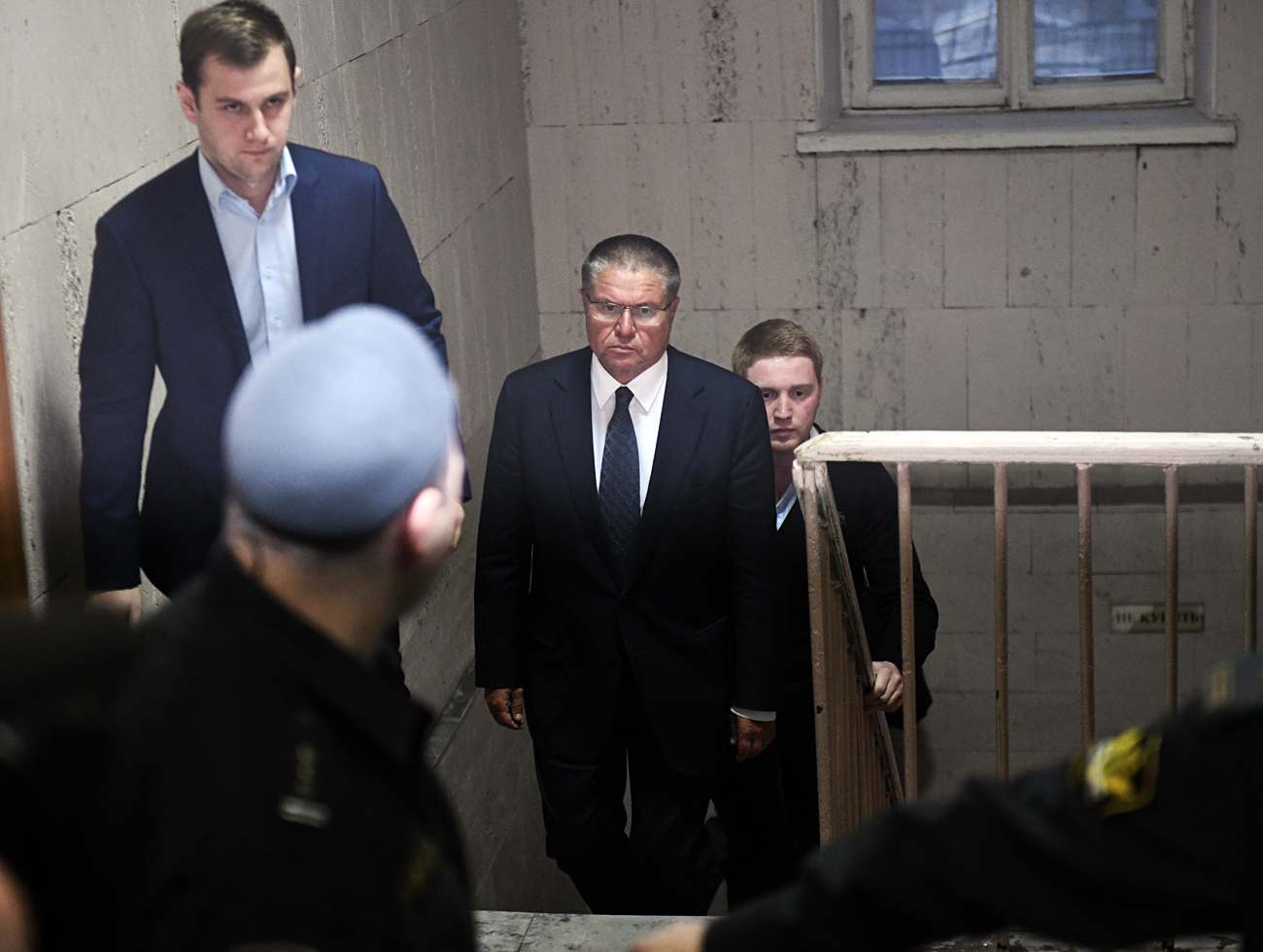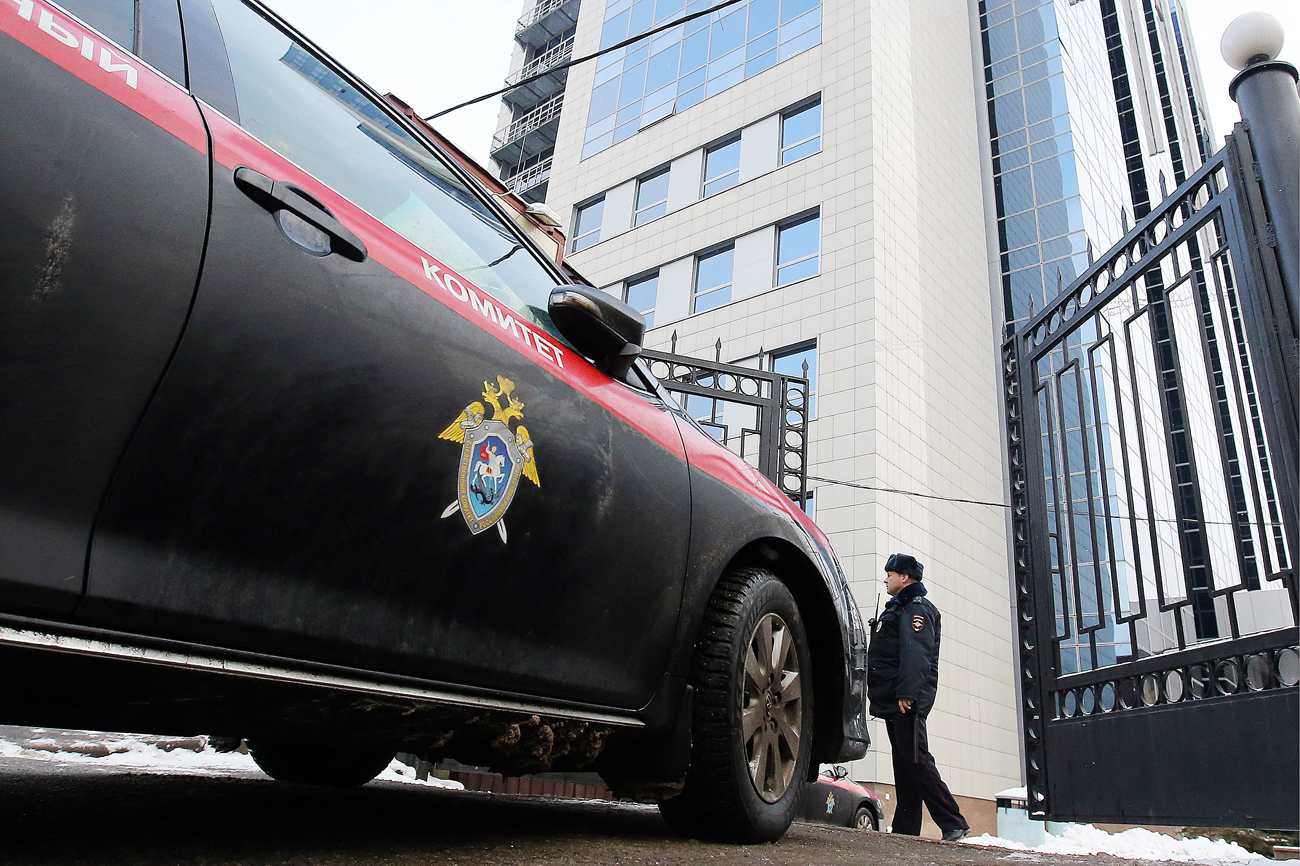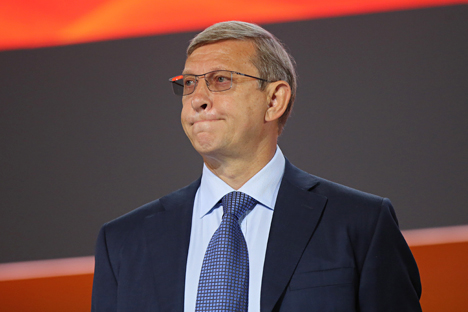Experts puzzled by bribery charges against Economy Minister Ulyukayev

Russian Economic Development Minister Alexei Ulyukayev at Moscow's Basmanny Court.
Maksim Blinov/RIA Novosti"He called several times, several people, including fairly high-ranking officials and law enforcers. And he asked everyone one question: 'What is going on here?'"
This is how a witness described Russian Economic Development Minister Alexei Ulyukayev’s reaction to a special operation to detain him for receiving a $2 million bribe, the report of which Russia’s main investigatory authority, the Investigative Committee published on Nov. 15.
Ulyukayev was reportedly caught red-handed as he was handed the money under the control of operatives. According to the Investigative Committee, the bribe is related to state-owned oil producer company Rosneft's purchase of a controlling stake in oil company Bashneft. Ulyukayev's department should have given a positive assessment of the contract, and the minister allegedly extorted the money for this, while issuing threats against Rosneft's representatives.
This is the first time in modern Russia that a serving federal minister has been placed under arrest (so far under house arrest) and charged. According to the RIA Novosti news agency's source in law enforcement, Ulyukayev has been investigated by the FSB [Federal Security Service] "certainly for more than a year," and, as Kremlin press secretary Dmitry Peskov confirmed, Russian President Vladimir Putin knew about it.
A representative of loyal liberals in the power structures, Alexei Ulyukayev has worked in the government for a total of 11 years, and served another nine years as the first deputy chairman of the Russian Central Bank.
While serving as economy minister, he advocated reforms against the strengthening of state control over the economy. He often found himself in confrontation with the Finance Ministry, which is responsible for the federal budget, and did not hesitate to give gloomy forecasts about the economy, predicting in October that it was entering a period of 20-year stagnation.
‘To take a bribe for a market valuation is a strange accusation’
His detention turned out to be so surprising, and the charges so implausible that many high-ranking officials could not resist speaking their mind, describing what is happening as "absurd" and a "strange accusation."
"He is the last who could be suspected of something like that," Sergei Shvetsov, first deputy head of the Central Bank, said, commenting on the detention. "What is written in the press looks absurd. Now nothing is clear."
"If Alexei Ulyukayev was accused of knocking down an old lady while driving a Geländewagen at high speed across Moscow at night, that would look more plausible," said Alexander Shokhin, who has held a number of ministerial posts and is now head of the Russian Union of Industrialists and Entrepreneurs (RSPP).
Experts are doubtful about two things: the size of the bribe and its feasibility.
"No one – neither the experts nor the officials – expressed any doubts that the price of Bashneft, 329 billion rubles [$5.03 billion], was the market one," said Shokhin. "So to take a bribe for a market valuation is a strange accusation."
In early October of this year, the government approved Rosneft's purchase of 50.0755 percent of the shares of one of Russia's largest oil producers, Bashneft, for $5.03 billion even though the auditors of the E&Y assessed the state-owned stake in the company at $4.67 billion.
The main contender for the controlling stake was Russia's largest private oil company Lukoil, but its head Vagit Alekperov, on the contrary, pointed out that the valuation of $4.67 billion was grossly overestimated. As a result, Igor Sechin's Rosneft remained the only buyer of Bashneft, and the deal was made without competition.
According to Valery Khomyakov, CEO of the independent National Strategy Council, the whole thing looks like a "set-up." "Igor Sechin is a longtime friend of Putin," he said. "Will a sane person threaten a friend of Putin? And $2 million is ridiculously small money for this level of official.”
"Police colonels steal billions that are found in their homes," said Khomyakov, recalling a recent corruption scandal involving the head of Russia’s anti-corruption unit.
In an interview with RBTH, Alexei Zudin, member of the advisory board of the Institute for Socio-Economic and Political Studies, said that it was not the amount of the bribe that mattered: It is still a large sum, and, in any case, a bribe is a bribe,
According to Zudin, it is another thing that is confusing: The Investigative Committee said that there were no claims of wrongdoing against Rosneft in this case, since the company purchased the stake legitimately.
"But if the transaction took place based on the assessment that was given for a bribe – can such a transaction be recognized as legal?" asked Zudin.
"It works the other way around, too – if the transaction is still legitimate, it means that Rosneft indeed offered a better price than the others. But then the bribe becomes meaningless."
Zudin suggested that a plausible explanation would follow, but so far none has been forthcoming.
A blow to liberals
Rosneft recommends that the Investigative Committee’s findings should be heeded and does not think that the Bashkir asset's purchase will be affected because of Ulyukayev's case.
"That's absurd. Come on, what are you talking about?" Rosneft spokesman Mikhail Leontyev said. "This is a brilliant deal, a super correct one. ... [The Investigative Committee], in my opinion, quite clearly, unambiguously formulated that there can and should be no claims against Rosneft."
So far, Ulyukayev is the only person involved in the case. There also are no claims against the VTB bank, which acted as a privatization agent.
"This is a very serious accusation that requires very strong evidence," said Kremlin spokesman Dmitry Peskov. "In any case, only a court can make a decision."
However, many point to the case's political connotations. Pavel Salin, director of the Center for Political Studies at the Financial University under the Government of the Russian Federation, said there are indeed many questions, including why a bribe was given after, rather than before privatization.
"Firstly, Ulyukayev is one of the bright representatives of the group of loyal liberals," said Salin. "Secondly, he is responsible for choosing a socio-economic policy, which has long been criticized by the liberals' opponents."
In his opinion, the case is a blow both to the positions of loyal liberals and their ideology, and probably the "blow will hit its target.”
Those polled by RBTH believe that the Ulyukayev case is undoubtedly also a blow to Prime Minister Dmitry Medvedev, but not so strong as to deprive him of his post.
"It is unlikely that anything threatens Medvedev in this case," said National Strategy Council CEO Khomyakov. "It does not matter what minister takes what. Ulyukayev comes from Gaidar's team [Yegor Gaidar was the main ideologist of the 1990s economic reforms]. I remember how, at the end of 1991, Gaidar became acting prime minister and invited party representatives. I was there, too, from the Democratic party of Russia, Ulyukayev served us with tea. 'Lyosha [a diminutive for Alexei], pour the tea,' Gaidar said."
Medvedev's political position had been very strong until Ulyukayev’s arrest, and it was further strengthened by the results of the elections held in September, said Zudin.
He was one of the beneficiaries of the successful Duma elections, as a result of which the ruling United Russia party won a constitutional majority. "Yes, this is a blow to him, but how strong will be shown by further developments," said Zudin.
Read more: Drawing a portrait of the average corrupt Russian>>>
Subscribe to get the hand picked best stories every week
All rights reserved by Rossiyskaya Gazeta.
Subscribe
to our newsletter!
Get the week's best stories straight to your inbox

